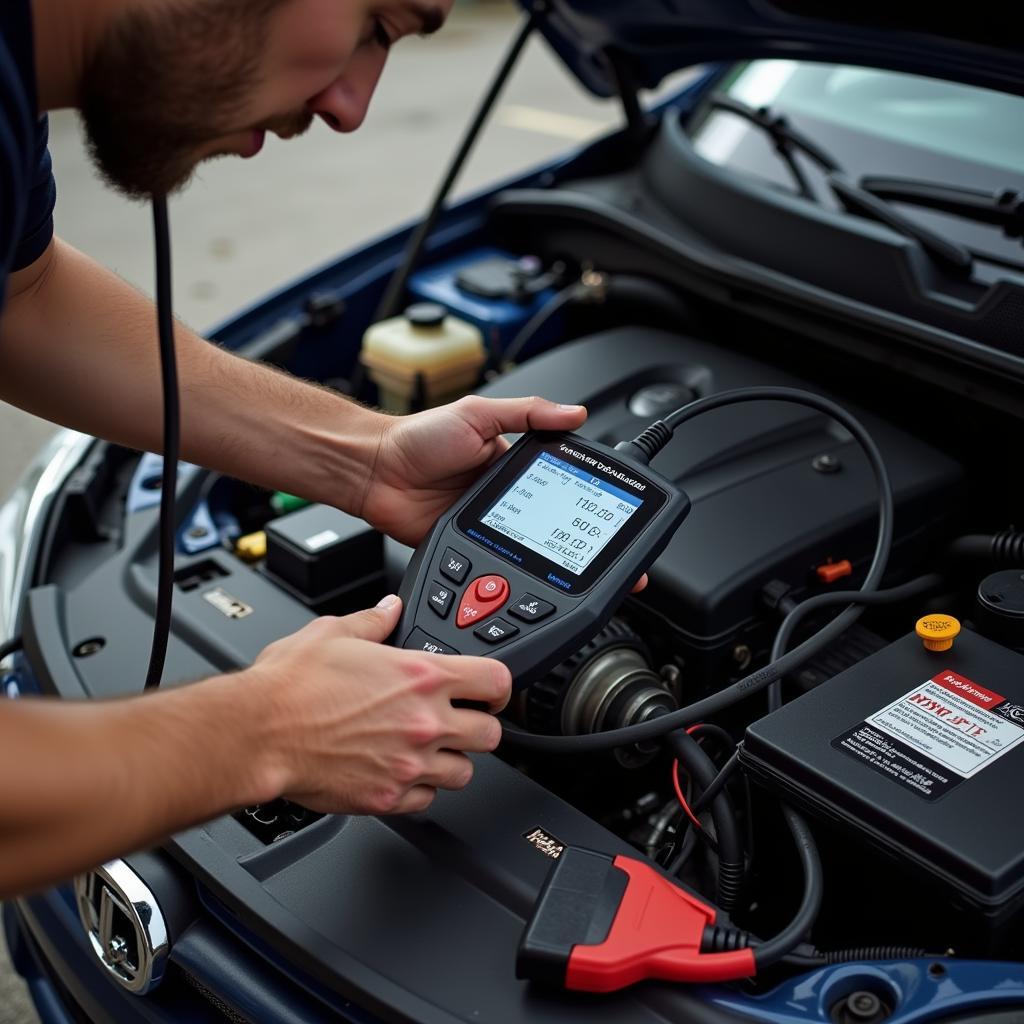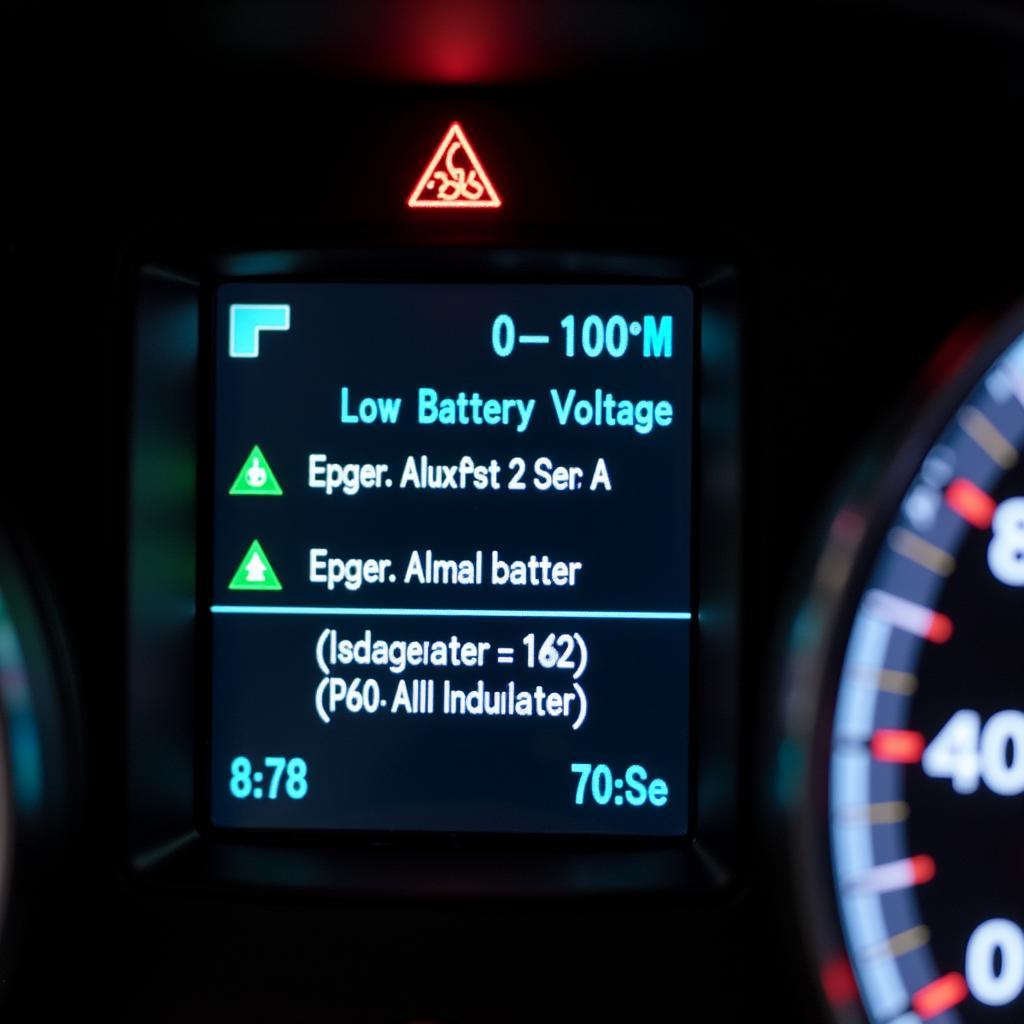A car diagnostic test checks battery health among many other crucial systems. Understanding how this test assesses your battery can save you from unexpected breakdowns and costly repairs. This article dives deep into the relationship between car diagnostic tests and your battery’s health.
How a Car Diagnostic Test Checks Your Battery
A car diagnostic test, using a device like the konnwei kw850 car diagnostic scanner tool, assesses your battery in several ways. It doesn’t simply tell you if your battery is “good” or “bad.” It provides a comprehensive overview of its condition, including voltage, charging system performance, and overall health. The test primarily focuses on these aspects:
- Battery Voltage: The test measures the battery’s voltage, both at rest and under load. A healthy battery typically registers around 12.6 volts when the engine is off.
- Charging System: The diagnostic test also examines the alternator and voltage regulator, crucial components for charging the battery. It ensures they are functioning correctly and providing the appropriate voltage.
- Battery State of Charge: The test determines how much charge the battery currently holds. This information can indicate if the battery is nearing the end of its lifespan.
- Starting/Cranking Voltage: During engine startup, the test measures the voltage drop. A significant voltage drop can point to a weak battery or a problem with the starting system.
Why is Checking the Battery During a Diagnostic Test Important?
A failing battery can cause various problems, from a simple no-start situation to more complex electronic issues. A car inspection and diagnostic check which includes a battery check is crucial for preventative maintenance.
- Prevent Unexpected Breakdowns: A diagnostic test can identify a weakening battery before it leaves you stranded.
- Diagnose Electrical Problems: Battery issues can sometimes manifest as seemingly unrelated electrical problems. A diagnostic test can pinpoint the root cause.
- Prolong Battery Life: Regular testing and proper maintenance can significantly extend your battery’s lifespan.
- Ensure Optimal Vehicle Performance: A healthy battery ensures the smooth operation of all electronic systems, from the ignition to the infotainment system.
What Does a Low Battery Reading Indicate?
A low battery reading on a diagnostic test can suggest several problems. It could indicate a failing battery, a faulty charging system, or even a parasitic drain that’s slowly depleting the battery’s power.
“A car diagnostic test is like a doctor’s checkup for your car,” says automotive expert, David Miller. “Checking the battery during this test is crucial, as it’s often the heart of many electrical systems.”
Beyond the Basics: Advanced Battery Diagnostics
Modern diagnostic tools go beyond simply checking voltage. Some advanced scanners can perform more in-depth battery tests, such as conductance testing. These tests can provide a more accurate assessment of the battery’s internal health and remaining lifespan.
How Often Should I Get a Car Diagnostic Test Including a Battery Check?
It is recommended to get a diagnostic test for cars in springs including a battery check at least once a year, or whenever you experience any electrical issues.
What if the Diagnostic Test Shows a Problem with the Charging System?
If the diagnostic test reveals a problem with the charging system, like the alternator or voltage regulator, it’s essential to address the issue promptly. A faulty charging system can eventually lead to a dead battery and leave you stranded. A qualified mechanic can car electrical diagnostic near me to diagnose and repair charging system problems.
“Ignoring a charging system problem is like running a marathon without replenishing fluids,” explains Sarah Chen, an experienced automotive electrician. “It’s only a matter of time before the system collapses.”
Conclusion
A car diagnostic test checks battery health and provides essential insights into your vehicle’s electrical system. Understanding how this test assesses your battery can help you prevent breakdowns, diagnose electrical issues, and prolong your battery’s life. Regular diagnostic tests, including battery checks, are a vital part of maintaining your vehicle and ensuring its optimal performance.
FAQ
- What is a car diagnostic test?
- How does a diagnostic test check the battery?
- What does a low battery reading indicate?
- How often should I get a battery check?
- What if the test shows a charging system problem?
- Can I perform a car diagnostic test myself?
- Where can I get a car diagnostic test done?
Car Diagnostic Test and Battery Check – Sample Pricing
| Service | Price Range |
|---|---|
| Basic Diagnostic Test (including battery check) | $50 – $100 |
| Advanced Diagnostic Test (including battery and charging system analysis) | $100 – $200 |
| Battery Replacement | $100 – $300 (depending on battery type) |
| Alternator Replacement | $200 – $500 |


Common Scenarios Related to Car Diagnostic Test and Battery Issues
- Scenario 1: Car won’t start. Diagnostic test shows low battery voltage.
- Scenario 2: Dim headlights and interior lights. Diagnostic test reveals a charging system issue.
- Scenario 3: Car experiences intermittent electrical problems. Diagnostic test identifies a failing battery.
Further Reading and Related Articles
Need help? Contact us via WhatsApp: +1(641)206-8880, Email: [email protected]. We have a 24/7 customer support team.


